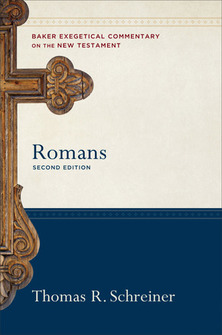Thomas Schreiner’s BECNT commentary on Romans has just undergone a major revision from the first edition, released 20 years ago. The second edition is a whopping 944 pages of thorough exegetical work, updated with the latest scholarship on Paul’s greatest letter. I had a chance to ask him a few questions about the highly-anticipated 2nd edition, which was just made available this week on Logos.
This commentary is a revised edition of your 1998 commentary on Romans. How did the project come about, through Baker’s initiative or yours? And what were some of the most compelling reasons behind releasing a new edition?
I honestly don’t remember how the first edition came about anymore. I think Baker asked me to participate. The new edition is necessary especially because of ongoing scholarly work on Romans. Most commentaries have a shelf life, and revising it gave me a chance to reconsider what I wrote the first time.
The market is inundated with commentaries, and Romans seems to top the list. In just the last few years, dozens of Romans commentaries have hit the shelves. What sets this second edition of the BECNT Romans commentary apart from the rest of the field? Related, why should somebody get a hold of this second edition if they already have the first?
I would never claim you have to buy my commentary to understand Romans. There are many excellent commentaries available. I try to set forth clearly the argument of the letter and its theological substance to a new generation. I would not say that someone has to have the new edition, but the new edition takes into account recent scholarship.
And I adjusted what I said in the first edition on the righteousness of God (a big subject!), Romans 2:14-15, Romans 5:12-14, and Romans 7:13-25. I made hundreds of smaller changes as well. The new edition is not lightly revised; it is a major revision of my previous work.
You dedicate the commentary to John Piper, as you did the first edition. What is your relationship with John and how has his preaching impacted your personal life, scholarship, and even teaching?
John was my preaching pastor for eleven years (1986-1997). John’s vision of God had a massive impact on me, and he helped me see that my scholarly life and teaching should be for the sake of the church. I will be forever grateful. Also, John is a scholar himself. He reminded me often that scholars may live for the praise of the academy instead of the glory of Christ.
Do you enjoy commentary writing, and what impact positive or negative did this workload have for your other research, your teaching, church life, and family?
Yes, I enjoy writing immensely. I actually think my writing helped me in the classroom and the 17 years I was a preaching pastor. On the other hand, being a pastor helped my writing. I always had an eye on the local church. I don’t think it interfered with family life. I gave myself space to finish what I was doing so that I never felt pressured to meet a deadline.
Let’s get to interpretive issues. Even partially-informed readers of Romans know that the letter contains a number of interpretive cruxes that have pitted scholars, laypeople, and indeed entire ecclesial traditions against each other (not to mention the Reformation!). You state in the preface to the second edition that your interpretive viewpoint at a few key points has changed. Could you identify some of those areas, and what circumstances brought about your change of mind?
I mention some of these above. I changed my mind on the phrase “righteousness of God,” arguing that it is forensic rather than transformative. Giving the reasons why would be difficult in a short space, but I think it is clear that the verb “justify” is forensic, and there are a good reasons for thinking that the noun phrase should not be distinguished from the verb, especially since the noun phrase and verb appear together in the same contexts (Romans 3:21-26).
I now see Romans 2:14-15 as referring to Christians instead of unbelieving Gentiles. The verses are incredibly difficult, but recent articles by Ardel Caneday and Simon Gathercole convinced me.
I also adjusted my interpretation of Romans 5:12-14, and the interpretive issues there are very complex. I did not change my mind on original sin, but on the specific argument in verse 12.
Also, I was greatly helped by Will Timmins‘s dissertation on Romans 7, and emphasize more clearly that Christians continue to struggle with their fleshiness and sin.
What part of Romans do you find most challenging to penetrate and why? Further to that question, what advice do you have for students of Romans when approaching a difficult text?
I think the most difficult paragraph in the book is Romans 3:1-8, probably because Paul addresses a number of topics quickly that he takes up later.
My advice to students is: be sure to study the text first thoroughly for yourself, and that way you won’t become a second-hand interpreter and just repeat what others have said. Study hard enough to be able to defend your position. Then when you read others be open to the text and arguments of others. Be humble enough to learn and to be corrected.
For those pastors and students who have perhaps “lost” their Greek or are struggling to be convinced of its usefulness, what can you say about the importance of interacting with the original Greek of Romans in particular? Related to that, how important is reading the LXX for readers of Romans?
Knowing the languages helps immensely. It gives you a standpoint by which you can critique other interpretations. Still, you can understand the text well with English if you study hard.
What advantages (or disadvantages) do you see with using Romans in a digital format such as Logos?
A digital format is ideal for using tools like grammars, lexicons, primary sources! We have the world at our fingertips. It is amazing!
How should pastors in particular engage with your commentary? Related, are there any best practices you recommend for anybody starting a series on Romans?
My commentary should be one resource they use in preparing messages. I would recommend doing a paragraph at a time.
Finally, if you could describe Paul’s epistle to the Romans in one word (not a phrase!) that embodies the entire message of the letter, what would that be?
The revelation of the righteousness of God!
 Thomas Schreiner’s Romans, 2nd Edition is now available for your Logos digital library, fully tagged and hyperlinked for the most in-depth and efficient research possible.
Thomas Schreiner’s Romans, 2nd Edition is now available for your Logos digital library, fully tagged and hyperlinked for the most in-depth and efficient research possible.






I need this book